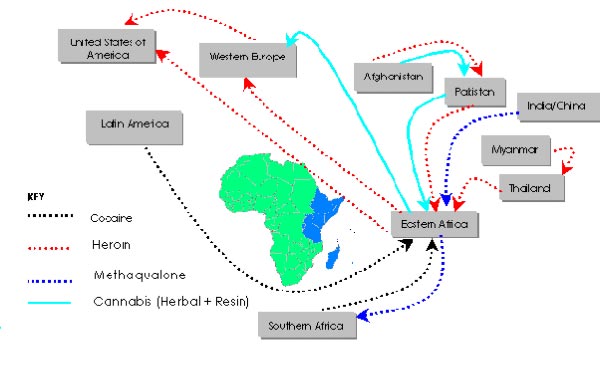Many of these products, sometimes imported without authorization, are sold by hawkers in street-markets.
There are two important international airports in the region, servicing
the capitals' of Ethiopia and Kenya, which are used as transit points
for illegal drugs.
In the period 1995-2006, reported seizures of heroin, cannabis and
cocaine in the region covered by UNODC Eastern Africaare comparatively
few and do not reflect the extent of trafficking, availability and
growing abuse in the region. The region is attractive to international
drug trafficking syndicates as they are quick to exploit non-existent or
ineffective border (land, sea and air) controls, limited cross border
and regional cooperation as well as serious deficiencies in the criminal
justice systems. Hence, the low seizure figures are more an indication
that few resources are allocated to drug control and that international
border controls are weak than a sign that no drugs are being trafficked
through the region.

The region covered by UNODC Eastern Africa is accessible by sea to heroin and cannabis resin producer countries in South West and South East Asia through the ports in Djibouti, Eritrea, Kenya and Tanzania. Anecdotal evidence suggests that Somalia, currently in the process of establishing a central authority, is host to widespread illegal transactions, including drug and arms trafficking. There are two important international airports in the region, servicing the capitals' of Ethiopia and Kenya, which are used as transit points for drugs. Both airports have connections between West Africa and the heroin‑producing countries in South West and South East Asia. There is also an increasing use of postal and courier services for cocaine, heroin and hashish.
" A review of drug seizures from 1998 to date indicates an increase in the trafficking of heroin to eastern African countries from Pakistan, Thailand and India. Increased seizures of heroin with Nigerian connections bound for Uganda, Tanzania and Kenya through Ethiopia have been noted as well. Seizures and arrest statistics show that more Tanzanians and Mozambicans are becoming involved in the trafficking of heroin from Pakistan and Iran."
West African syndicates, with their experience in cannabis and heroin smuggling, are actively networking in Latin America, and are responsible for the emergence of cocaine trafficking and abuse in eastern Africa. As shown in graph (3), although the volume of cocaine seized in Africa is still relatively small, the situation is changing as trafficking groups extend their highly-organised networks. In most countries in the ROEA region it is possible to purchase pharmaceutical products on demand without presenting a valid prescription. Many of these products, sometimes imported without authorization, are sold by hawkers in street-markets.
Unfortunately, the situation has been worsening in the last 10‑15 years. In the majority of the countries in the UNODC Eastern Africa region, control and monitoring of the national drug supply and distribution channels, including precursors, are inefficient. This results not only in the ineffective control of pharmaceutical products, but also in the circulation of counterfeit medicines. Together these pose serious health and socio‑economic problems, they undermine law enforcement activities and confidence in public health services.
The emergence of Mandrax in the region has gone hand in hand with the diversion of licit drugs and essential chemical precursors into the illicit market. The control of essential chemical precursors that are either being trafficked through the UNODC Eastern Africaregion to countries producing cocaine and heroin or used in the illegal production of Mandrax, is an important part of the battle against drugs in the region. It is feared that illegal trafficking, importation and use will continue as long as there are no effective control mechanisms in the countries of the region.















